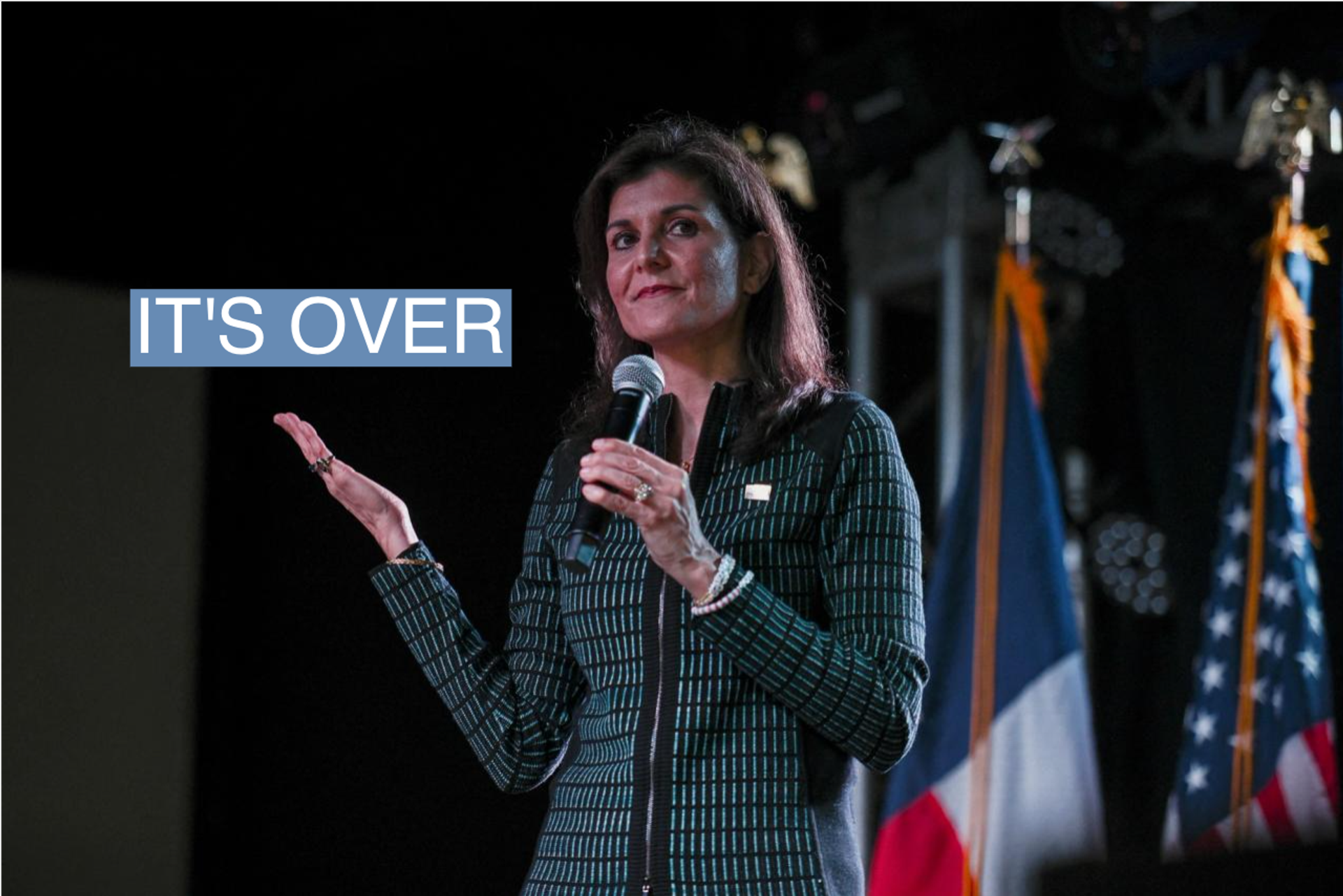The News
Nikki Haley suspended her presidential campaign after getting routed by Donald Trump on Super Tuesday. Speaking in Charleston on Wednesday, she said she had “no regrets” and thanked her supporters — who she warned Trump not to take for granted.
“It is now up to Donald Trump to earn the votes of those in our party and beyond it who did not support him, and I hope he does that,” said Haley, who did not endorse the former president in her remarks.
The move comes less than two weeks after Haley, in a defiant “state of the race” speech, pledged to fight on through Super Tuesday, while leaving her later plans ambiguous. In recent weeks, Haley had sharpened her criticism of Trump, arguing that “chaos” followed him, questioning his mental fitness, blaming him for Republicans’ repeated underperformance in recent election cycles, and accusing him of siding with autocrats like Vladimir Putin.
But Haley was unable to build on her unsteady coalition, garnering support from 25% or less of self-identified Republicans, and a majority of non-Republicans who chose to vote in the party’s primaries. On Tuesday, after a campaign that took her across the map, she narrowly carried Vermont while losing 14 other states.
Know More
Haley, the second major candidate to enter the race, outlasted challengers who had considerably more resources and more overlap with the MAGA-era GOP. By sticking in after her home state loss, she became the first woman, and first person of color, to win a Republican presidential primary — first D.C., then Vermont.
She gained ground after each televised presidential debate, deflecting attacks from Vivek Ramaswamy and Mike Pence, and ending a friendly-fire challenge from Sen. Tim Scott, who she’d appointed to his seat in 2012. After a slow start, she took in more money from small and large donors every month she stayed in the race — including out-raising Trump’s campaign in January.
“I defeated a dozen of the fellas,” she joked at campaign stops in February, after Florida Gov. Ron DeSantis folded up his campaign. “I just got one more fella to go.”
But Haley never found her footing in a Republican electorate determined to pick Trump. In exit polls of New Hampshire and South Carolina, the ex-president carried self-identified Republicans by around 50 points. Haley won among independents and Democrats who chose to vote in the GOP primary to stop Trump, encouraged by her SFA Fund super PAC and outside PACs like Primary Pivot.
Republican voters didn’t buy it. Haley drew attention to polls that showed her out-performing Trump in a race against Biden, especially a Wall Street Journal poll in December that put her 17 points ahead.
“That’s bigger than the presidency!” Haley told voters. “That’s House, that’s Senate, that’s governorships, all the way down to school boards.”
But primary voters told pollsters that they saw Trump as more electable than Haley — and that they believed that he had truly won the 2020 election. In South Carolina, where Haley had never lost an election before Feb. 24, 59% of voters said that Haley would likely defeat Biden, while 82% said that of Trump. Just 35% said that Biden had “legitimately won” the last election.
SHELBY AND DAVID’S VIEW
Haley will now face three questions — whether she’ll endorse Trump, whether she’ll release her 89 delegates, and whether she’ll run for president again in 2028. She has already said, repeatedly, that she wouldn’t continue her anti-Trump campaign as a third-party candidate.
“I would not run as No Labels because I am a Republican,” Haley said on Fox News yesterday, typical of the process-heavy questions she fielded at the end of the race.
Since 2014, when Haley removed the Confederate Flag from the state capitol grounds after a white supremacist massacred black church members in Charleston, the political press corps viewed her as a potential presidential candidate. Her 2024 pitch was straightforward: She’d worked with Trump and voted for him, but his time had passed, and he’d lost too many races to trust with the nomination.
That got her to Super Tuesday, but the strategy had limits, both electorally and logically. Simply put, she underestimated Trump. In Jan. 2021, she told reporter Tim Alberta that Trump was “not going to run for federal office again,” and had “fallen so far” after the Capitol insurrection that he really couldn’t. Three months later, she told reporters in South Carolina that she “would not run if President Trump ran,” a pledge she had to walk back.
This was before Trump began to face indictments over his campaigns and businesses, which supercharged his support from the GOP electorate. Haley tried to package every Trump scandal as a “distraction” or “chaos,” usually without passing judgment on their legitimacy, then pivot to her actual issues — electability, support for Ukraine’s defense against Russia, and spending cuts.
It all helped her win protest votes from Democrats, and impressed donors, but the Republican base had moved on before the primaries began.
The View From Donald Trump
Despite Haley’s warning, neither Trump nor his campaign has shown any visible concern about her supporters abandoning the party in November. On Truth Social, Trump boasted that “she got TROUNCED” and said that her donations came from “Radical Left Democrats.”
The View From Joe Biden
“Donald Trump made it clear he doesn’t want Nikki Haley’s supporters,” Biden said in a statement. “I want to be clear: There is a place for them in my campaign. I know there is a lot we won’t agree on. But on the fundamental issues of preserving American democracy, on standing up for the rule of law, on treating each other with decency and dignity and respect, on preserving NATO and standing up to America’s adversaries, I hope and believe we can find common ground.”
